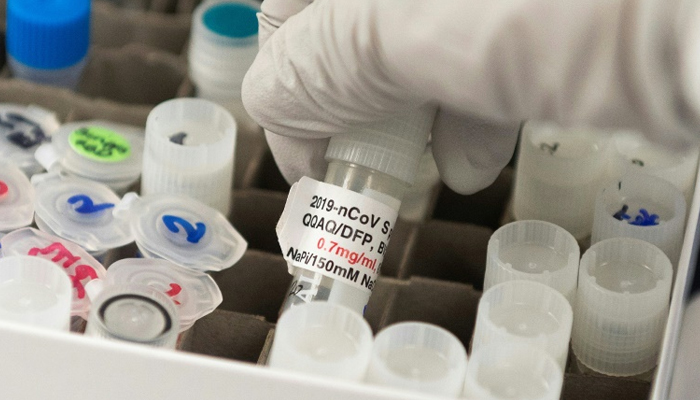
LONDON: British pharmaceuticals group AstraZeneca on Thursday said it had secured more than $1.0 billion from the United States to help fund production of its coronavirus vaccine.
AstraZeneca is partnering with University of Oxford to develop and distribute a vaccine being trialled in the UK.
It comes amid concerns that the United States could have a vaccine before other countries thanks to its large-scale funding of pharmaceutical companies around the world.
France has slammed Paris-based drugs giant Sanofi for suggesting the US would receive its vaccine first, as world leaders demand that the science should be shared among nations.
AstraZeneca on Thursday said it had "received support of more than $1.0 billion from the US Biomedical Advanced Research and Development Authorit for the development, production and delivery of the vaccine".
The company however added it was in contact with governments and international health institutions to ensure the vaccine is available globally.
AstraZeneca said it had concluded deals for the first 400 million doses of the vaccine — and has manufacturing capacity for one billion doses, with it hoping to begin deliveries in September.
'Accessible globally'
"AstraZeneca is advancing its ongoing response to address the unprecedented challenges of COVID-19, collaborating with a number of countries and multilateral organisations to make the University of Oxford's vaccine widely accessible around the world in an equitable manner," a statement said.
The company added it was "engaging with international organisations", including the World Health Organization, for the fair allocation and distribution of the vaccine around the world".
"AstraZeneca is also in discussions with governments around the world to increase access."
Britain this week pledged £84 million ($103 million, 93 million euros) to be split between researchers at Oxford University and Imperial College London to help finance a COVID-19 vaccine.
The UK government had already given £47 million.
Human trials of the vaccine developed by Oxford's Jenner Institute began last month, with hundreds of people in Britain volunteering to be part of the study.
The COVID-19 pandemic has killed more than 325,000 people worldwide, three-quarters of them in Europe and the United States, since breaking out in China last December.
More than five million have been infected globally by the pandemic, sparking a rush by pharmaceutical companies across the world to try and develop treatments and vaccines.
"This pandemic is a global tragedy and it is a challenge for all of humanity," AstraZeneca chief executive Pascal Soriot said in Thursday's statement.
"We need to defeat the virus together or it will continue to inflict huge personal suffering and leave long-lasting economic and social scars in every country around the world.;



Comments
Post a Comment
if you have any doubts. Please let me know